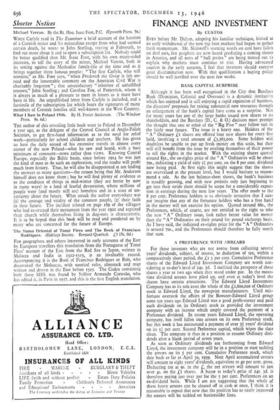FINANCE AND INVESTMENT
By CUSTOS
EVEN before Mr. Dalton, adopting his familiar technique, hinted at an early withdrawal of the new tap loan markets had begun to gather fresh momentum. Mr. Shinwell's warning words on coal have fallen on deaf ears, few prophets are now heard predicting a coming slump in America, and all sorts of " bull points " are being trotted out to explain why markets must continue to rise. Having advocated caution in the early autumn, I feel that investors should exercise great discrimination now. With that qualification a buying policy should be well justified over the next few weeks.
BANK CAPITAL SURPRISE
Although it has been well recognised in the City that Barclays Bank (Dominion, Colonial and Overseas) is a dynamic institution which has enjoyed and is still enjoying a rapid expansion of business, the directors' proposals for raising substantial new resources through an enlargement of the bank's capital have come as a surprise. Not for many years has any of the large banks issued new shares to its shareholders, and the Barclays (D., C. & 0.) decision must prompt the thought that one or other of the " Big Five " may follow suit in the fairly near future. The issue is a heavy one. Holders of the " A " Ordinary £4 shares are offered four new shares for every five held, involving a total amount of L5,365,000. Some holders will doubtless be unable to put up fresh money on this scale, but they will still benefit from the issue by availing themselves of their power to sell the rights in the market. With the existing shares quoted around 85s., the ex-rights price of the " A " Ordinaries will be about 7os., indicating a yield of only 21 per cent. on the 8 per cent. dividend now being paid. At first sight this might suggest that the shares are overvalued at the present level, but I would hesitate to recom- mend a sale. As the last balance-sheet shows, the bank's business is steadily growing, and with new projects only just beginning to get into their stride there should be scope for a considerable expan- sion in earnings during the next few years. The offer made to the 8 per cent. Preference holders is so obviously attractive that I can- not imagine that any of the fortunate holders who has a free hani in the matter will not exercise his option. Quoted around 66s., the Preferences, which, of course, are not entitled to the right to take the new " A " Ordinary issue, look rather better value for money than the "A" Ordinaries on their pound for pound exchange basis. As I have said, the indicated ex-rights price for the "A" Ordinaries is around 7os., and the Preferences should therefore be fully worth that sum.
A PREFERENCE WITH ARREARS
For those investors who are not averse from collecting several years' dividends, subject, of course, to deduction of tax, within a comparatively short period, the LI 5 per cent. Cumulative Preference shares of the Edward Lloyd Investment Company are worth con- sidering at to-day's level of 24s. 3d. I outlined the prospects of these shares a year or two ago when they stood under par. In the mean- time dividend arrears have piled up, and even at today's level the shares have certain attractions. The Edward Lloyd Investment Company has as its sole asset the whole of the £4600,00o of Ordinary stock in Edward Lloyd, the newsprint manufacturers. Until mis- fortune overtook the affairs of the Bowater-Edward Lloyd group some ten years ago Edward Lloyd was a good profit-earner and paid such dividends on its Ordinary stock as provided the investment company with an income which amply covered the payment of a Preference dividend. In recent years Edward Lloyd, the operating company, has itself fallen into arrears on its own Preference stock, but this week it has announced a payment of over 3+ years' dividend on its 54 per cent. Second Preference capital, which wipes the slate clean. The company is thus in a position to resume Ordinary divi- dends after a blank period of seven years.
As soon as Ordinary dividends are forthcoming from Edward Lloyd, the investment company will be in a position to start tackling the arrears on its 5 per cent. Cumulative Preference stock, which date back as far as April 3o, 1939. Next April accumulated arrears will amount to eight years' dividends, equivalent to 4o per cent. gross. Deducting tax at 9s. in the L the net arrears will amount to just over 4s. on the LI shares. A buyer at today's price of 24s. 3d. is therefore paying just over par for the 5 per cent. Preferences on an ex-dividend basis. While I am not suggesting that the whole of these heavy arrears can be cleared off in cash at once, I think it is reasonable to expect that now that the position has so vastly improved the arrears will be tackled on businesslike lines.


































 Previous page
Previous page